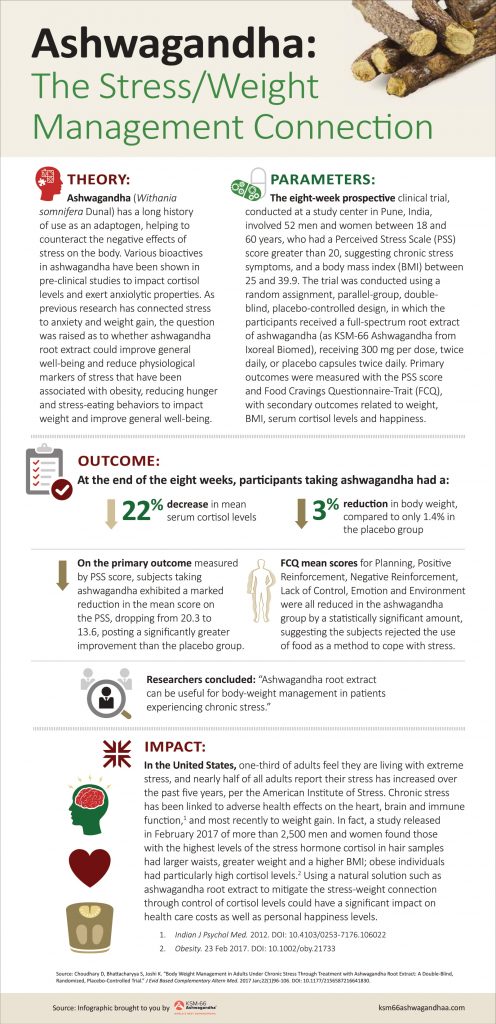Ashwagandha for Weight Management
July 2020
Theory
Ashwagandha (Withania somnifera Dunal) has a long history of use as an adaptogen, helping to counteract the negative effects of stress on the body. Various bioactives in ashwagandha have been shown in pre-clinical studies to impact cortisol levels and exert anxiolytic properties. As previous research has connected stress to anxiety and weight gain, the question was raised as to whether ashwagandha root extract could improve general well-being and reduce physiological markers of stress that have been associated with obesity, reducing hunger and stress-eating behaviors to impact weight and improve general well-being.
Parameters
The eight-week prospective clinical trial, conducted at a study center in Pune, India, involved 52 men and women between 18 and 60 years, who had a Perceived Stress Scale (PSS) score greater than 20, suggesting chronic stress symptoms, and a body mass index (BMI) between 25 and 39.9. The trial was conducted using a random assignment, parallel-group, double- blind, placebo-controlled design, in which the participants received a full-spectrum root extract of ashwagandha (as KSM-66 Ashwagandha from Ixoreal Biomed), receiving 300 mg per dose, twice daily, or placebo capsules twice daily. Primary outcomes were measured with the PSS score and Food Cravings Questionnaire-Trait (FCQ), with secondary outcomes related to weight, BMI, serum cortisol levels and happiness

Outcome
At the end of the eight weeks, participants taking ashwagandha had a:
- 22% decrease in mean serum cortisol levels
- 3% reduction in body weight, compared to only 1.4% in the placebo group
On the primary outcome measured by PSS score, subjects taking ashwagandha exhibited a marked reduction in the mean score on the PSS, dropping from 20.3 to 13.6, posting a significantly greater improvement than the placebo group.
FCQ mean scores for Planning, Positive Reinforcement, Negative Reinforcement, Lack of Control, Emotion and Environment were all reduced in the ashwagandha group by a statistically significant amount, suggesting the subjects rejected the use of food as a method to cope with stress.
Researchers concluded:
“Ashwagandha root extract can be useful for body-weight management in patients experiencing chronic stress.”
Click here To Download This Resource
Impact
In the United States, one-third of adults feel they are living with extreme stress, and nearly half of all adults report their stress has increased over the past five years, per the American Institute of Stress. Chronic stress has been linked to adverse health effects on the heart, brain and immune function,[1]and most recently to weight gain. In fact, a study released in February 2017 of more than 2,500 men and women found those with the highest levels of the stress hormone cortisol in hair samples had larger waists, greater weight and a higher BMI; obese individuals had particularly high cortisol levels[2]. Using a natural solution such as ashwagandha root extract to mitigate the stress-weight connection through control of cortisol levels could have a significant impact on health care costs as well as personal happiness levels.
- Indian J Psychol Med. 2012. DOI: 10.4103/0253-7176.106022
- Obesity. 23 Feb 2017. DOI: 10.1002/oby.21733
